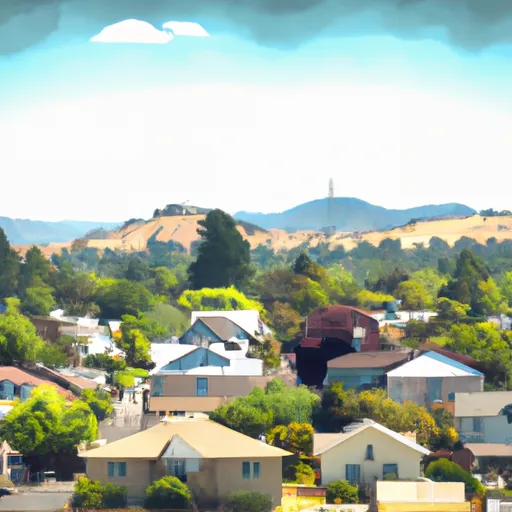-
 Snoflo Premium
Snoflo Premium
Get unlimited access to all our content
With no Ad interruptions! - Start Your Free Trial Login with existing account
Mokelumne-Hill
Eden Index
Climate
9.8
•
Recreation
5.2
•
Community
•
Safeguard
5.7/10

Mokelumne Hill is a small historic town located in Calaveras County, California. Situated in the Sierra Nevada foothills, the town enjoys a Mediterranean climate characterized by hot, dry summers and mild, wet winters. Summer temperatures can reach highs in the mid-90s°F (35°C), while winter temperatures seldom drop below freezing.
The hydrology of Mokelumne Hill is influenced by the Mokelumne River, which flows nearby. The river is known for its clear water and abundant fish, making it a popular spot for fishing and swimming. Additionally, the Mokelumne River provides opportunities for kayaking, canoeing, and tubing.
Outdoor recreation opportunities in Mokelumne Hill are plentiful. The surrounding areas offer numerous hiking and biking trails that showcase the region's beautiful landscapes and wildlife. Adventure seekers can explore the nearby Calaveras Big Trees State Park, home to giant sequoias, or visit the nearby New Melones Lake for boating, water skiing, and fishing. Mokelumne Hill also offers historical walking tours, art galleries, and quaint shops that reflect its rich Gold Rush heritage. With its pleasant climate and diverse outdoor activities, Mokelumne Hill is an ideal destination for nature lovers and history enthusiasts alike.
What is the Eden Index?
The Snoflo Eden Index serves as a comprehensive rating system for regions, evaluating their desirability through a holistic assessment of climate health, outdoor recreation opportunities, and natural disaster risk, acknowledging the profound impact of these factors on livability and well-being.
Climate Health Indicator (CHI): 9.8
Mokelumne-Hill receives approximately
905mm of rain per year,
with humidity levels near 75%
and air temperatures averaging around
16°C.
Mokelumne-Hill has a plant hardyness factor of
9, meaning
plants and agriculture in this region tend to thrive here all year round.
By considering the ideal temperature range, reliable water supplies, clean air, and stable seasonal rain or snowpacks, the Climate Health Indicator (CHI) underscores the significance of a healthy climate as the foundation for quality living.
A healthy climate is paramount for ensuring a high quality of life and livability in a region, fostering both physical well-being and environmental harmony. This can be characterized by ideal temperatures, reliable access to water supplies, clean air, and consistent seasonal rain or snowpacks.
Weather Forecast
Streamflow Conditions
San Joaquin
Area Rivers
San Joaquin
Snowpack Depths
San Joaquin
Reservoir Storage Capacity
San Joaquin
Groundwater Levels
Recreational Opportunity Index (ROI): 5.2
The Recreational Opportunity Index (ROI) recognizes the value of outdoor recreational options, such as parks, hiking trails, camping sites, and fishing spots, while acknowledging that climate plays a pivotal role in ensuring the comfort and consistency of these experiences.
Access to outdoor recreational opportunities, encompassing activities such as parks, hiking, camping, and fishing, is crucial for overall well-being, and the climate plays a pivotal role in enabling and enhancing these experiences, ensuring that individuals can engage in nature-based activities comfortably and consistently.
Camping Areas
| Campground | Campsites | Reservations | Toilets | Showers | Elevation |
|---|---|---|---|---|---|
| Frogtown RV Park | None | 1,544 ft | |||
| Sly Park | 191 | 3,596 ft | |||
| Indian Grinding Rock State Park | 22 | 2,378 ft | |||
| Pipi | 51 | 3,922 ft | |||
| Big Oak - Glory Hole Area - New Melones Lake | 55 | 1,050 ft | |||
| Oak Knoll - New Hogan Lake | None | 716 ft | |||
| Gloryhole Rec Area- Ironhorse - USBR | 300 | 1,172 ft | |||
| Acorn - New Hogan Lake | None | 699 ft | |||
| Acorn - Tuttletown Area - New Melones Lake | 69 | 1,050 ft | |||
| Manzanita - Tuttletown Area - New Melones Lake | 60 | 1,179 ft |
Nearby Ski Areas
Catastrophe Safeguard Index (CSI):
The Catastrophe Safeguard Index (CSI) recognizes that natural disaster risk, encompassing floods, fires, hurricanes, and tornadoes, can drastically affect safety and the overall appeal of an area.
The level of natural disaster risk in a region significantly affects safety and the overall livability, with climate change amplifying these risks by potentially increasing the frequency and intensity of events like floods, fires, hurricanes, and tornadoes, thereby posing substantial challenges to community resilience and well-being.
Community Resilience Indicator (CRI):
The Community Resilience Indicator (CRI) recognizes that education, healthcare, and socioeconomics are crucial to the well-being of a region. The CRI acknowledges the profound impact of these elements on residents' overall quality of life. By evaluating educational resources, healthcare accessibility, and economic inclusivity, the index captures the essential aspects that contribute to a thriving community, fostering resident satisfaction, equity, and social cohesion.

